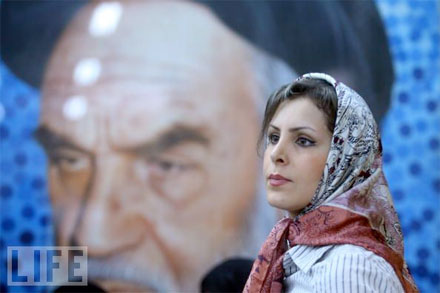
The acceleration in the rate of literacy among Iran’s women, paired with their significant achievements in education during the last three decades has empowered them to fight for their rights, and challenge the institutionalized discrimination against them.
Advancements in communication technology play an important role in the wave of women’s empowerment, as it is one of the most effective channels through which to advocate equality, and to educate other women on how to reclaim their rights. The increase of female bloggers, and their participation in the virtual world exposes Iran’s women to viewpoints that they might have never had the opportunity to consider.
After the Islamic Revolution in 1979, Iranian women were stripped of many of the rights they had gained through the years prior. Still today, the fundamentalists deny the equality of women through outdated laws and regulations, meant to oppress the sector of society, and restrict the role of women in public life. Just as an example, the Islamic laws upheld by the regime are highly discriminatory towards mothers just as outrageous; violence against women is not always considered a crime. Today, it is not secret that women are suffering from violent and suppressive force under the Islamic laws, the laws which are the founding principles of the Islamic Regime.
Islamic Republic is one of the most discriminatory regimes in today’s world. Tens of thousands of women have been executed in Iran since the infamous Islamic revolution- among them were 13 years old girls, pregnant women as well as the elderly. According to the 2009 Human Development Report of the United Nations Development Programme, the Islamic Republic of Iran ranks 103rd on the Gender Empowerment Measure among the 182 countries surveyed. But Iran’s discriminatory vision is not confined to Iran, its backwardness is being exported to Iraq, Afghanistan and Turkey, among other Islamic countries. Women in these states are increasingly experiencing the wrath of discrimination as preached by Iran’s Ayatollahs.
According to the Islamic Republic of Iran, the value of a women is half that of a man. A Jewish, Christian or Zoroastrian woman is worth a quarter of a Moslem man. There is no value for not recognized religions like Baha’i—killing them is no crime.
In Iran, the right of divorce is absolutely with men. Women do not have legal custody of their children; even if the husband is deceased- custody is given to the nearest living male relative. Women’s inheritance rights are half that of men. Iran’s women are not allowed to leave home, work or enroll in university or travel without their husbands’ permission. Women are excluded from working as judges or holding positions in main organs of the government. Their testimonies as witness in court are half as credible. The Islamic Laws consider women “immature,” stating they need guardians; yet a nine year old girl can be punished as an adult by flogging, and execution.
In 2007 a family protection bill was presented in the Islamic Republic of Iran’s Parliament. This bill, despite its name, only further destabilizes the family by robbing women further of their rights. Under this law, men are allowed temporary marriages without consent of the first wife.
During Khatami’s presidency, parliament passed a bill to prohibit the publication of materials that defended women’s rights and announced that advocates of women’s right are subject to “imprisonment and lashing for violations.” Also a proposal for sexual segregation in hospitals and medical institutions introduced to parliament but was rejected only for the cost.
More than 60% of Iran’s students today are women, yet they receive a mere 13% of job opportunities. Recently, Kamran Deneshjou, Minister of Science, Research and Technology announced his support to limit the acceptance of female students in universities in certain fields, in favor of male students.
This is all just a glance on discriminatory laws and policies against women in Iran.
Despite the knowledge that breaking the law might lead to execution, women have been noticeable at the forefront of the movement for democratic change in Iran. These activists have faced harassment, torture, travel bans and detention. The most inconceivable types of torture are inflicted on female prisoners who are only provided with the minimum of health services behind prison walls, if any.
Execution, imprisonment, flogging and denial of work have starkly increased in the last few years. Verdicts for the death penalty cases have been shamelessly obtained based on confession during tortures in Iran infamous hidden prisons where ‘secret’ executions are known to take place as well.
More than 50 percent of Media and Communication graduates are women, which perhaps explains why Iran is ranked highest in the world in the imprisonment of journalists. There are 325 journalists believed to be in prison, about 100 of which are female. They punished solely for the exercise of free speech, which is not a right under Islamic Law.
The treatment of women under Islamic Rule in Iran is blasphemous. Women are not property, live-stock or slaves to be pushed around and dictated to, denied their natural rights and humiliated on a daily basis. The 21st century is a time for progress and forward thinks- equality, camaraderie and integrity. The Islamic Republic’s legal code which, is cleverly devised to maintain the elevated position of men in society, is an outdated tool being used against Iran’s women. Unfortunately, the world has chosen to stand by- idly, allowing for the oppressive nature of radical Islamic to re-assert itself in today’s world.
Inhumane, irrational and outdated laws against women must come to an end.
AUTHOR
Elham Yaghoubian, is a writer, activist and Co-founder of MPG, Iranians for a Secular Republic organization.






